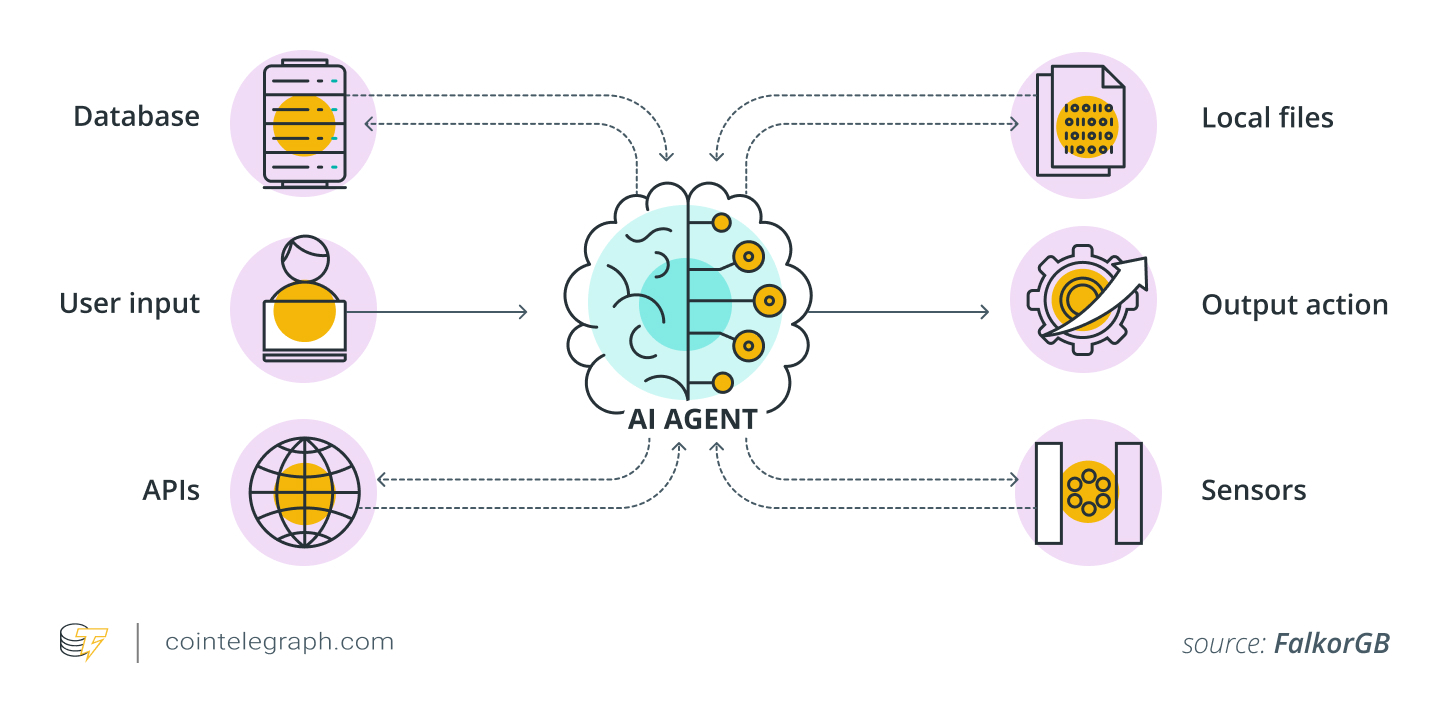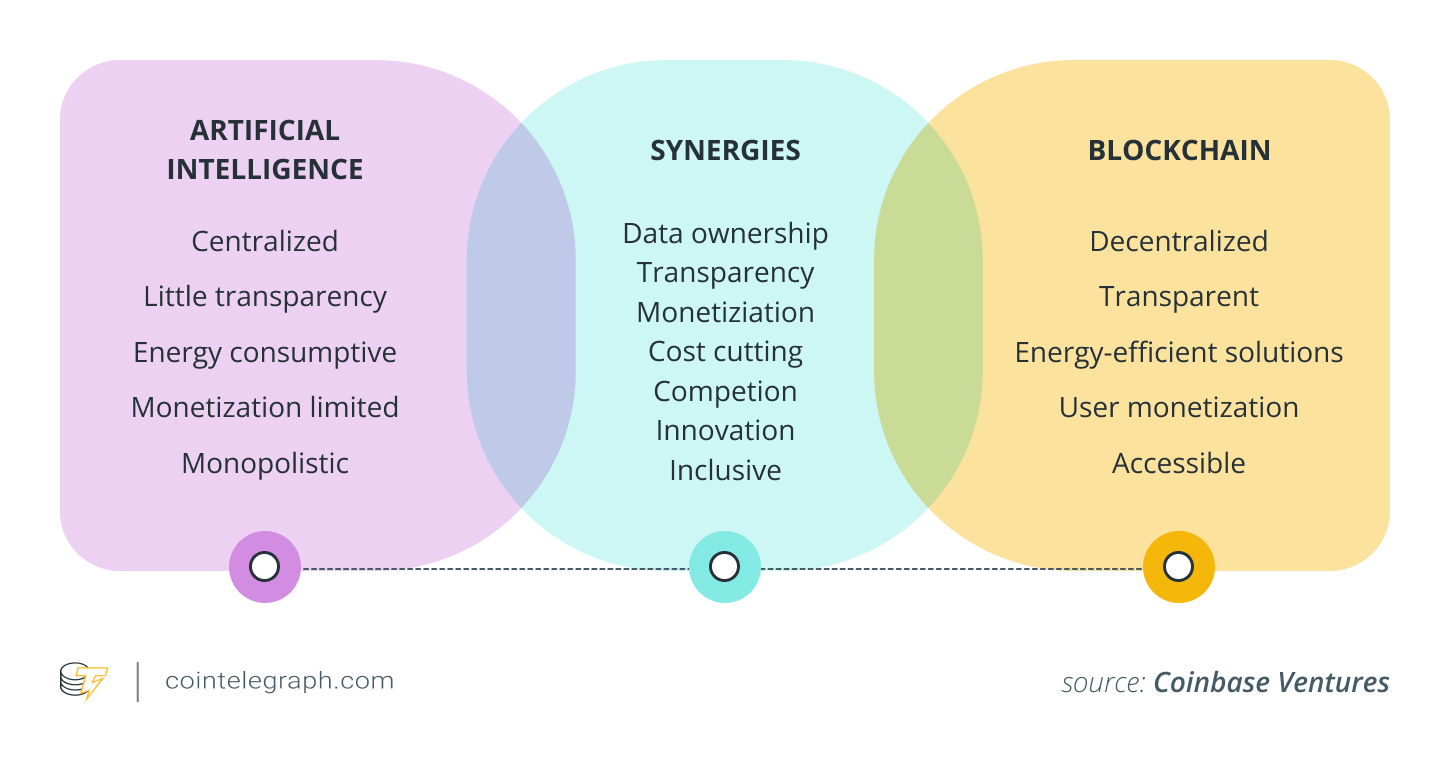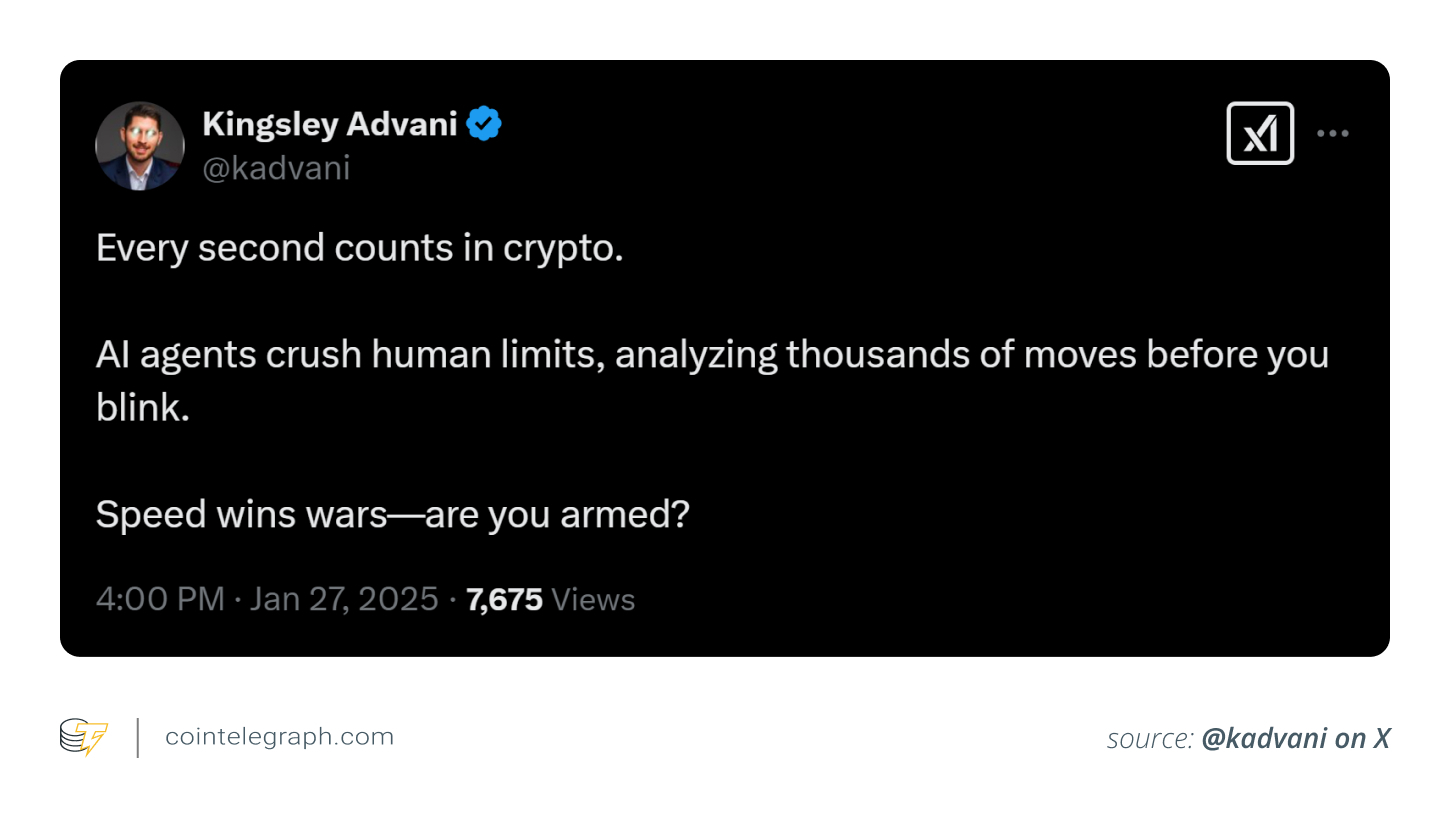AI agents can enhance decentralized finance (DeFi) by increasing automation, optimizing risk management, and improving trading strategies, driving efficiency and innovation in the field.
Key Points
- AI agents in DeFi are autonomous applications that can optimize trading, increase risk management and market analysis capabilities without human intervention.
- These agents integrate with DeFi platforms through smart contracts to automate tasks such as portfolio rebalancing, yield farming, and enhanced security.
- AI trading agents can adapt to real-time market conditions, identify trends, and execute trades across multiple platforms 24/7.
- While AI agents have significant potential, they face challenges such as dependence on high-quality data, regulatory uncertainty, and security vulnerabilities.
Imagine a world where trading is no longer limited by human financial knowledge and capabilities. In this world, machines not only execute trades but also autonomously adapt to market conditions and continuously optimize their trading strategies. This is not a distant future, but a reality that AI agents are driving in the decentralized finance (DeFi) space.
AI agents are autonomous software programs that can make decisions independently without human intervention. They use machine learning algorithms to continuously optimize their processes and adapt to market changes.
In traditional finance, AI has already profoundly transformed trading, risk management, and customer service. In DeFi, where trust is based on code rather than intermediaries, the integration of AI further promotes the autonomy, transparency, and efficiency of the financial system.
This article will explore the concept of AI agents and how they can be effectively utilized in DeFi platforms.
How AI Agents Empower DeFi
AI agents are like intelligent assistants residing within DeFi platforms, responsible for managing financial affairs. They integrate with smart contracts and decentralized applications (DApps), which are similar to traditional applications but run on the blockchain.
Some DeFi platforms have already incorporated AI agents that can collaborate with decentralized exchanges (DEXs) and lending platforms, making transactions more intelligent, secure, and efficient. However, some AI agents require users to download specific applications or bots to begin interacting.
For example, an AI agent can monitor interest rate trends on the Aave platform and optimize borrowing strategies. If the borrowing rate on Aave falls below a certain threshold, the AI agent can automatically adjust the user's portfolio, shifting funds to more profitable lending markets.
On the other hand, some DeFi platforms offer AI capabilities through subscription services. Users pay a small fee, and the AI can then execute automated trades, portfolio rebalancing, and other tasks on their behalf, without the need for manual intervention.
AI agents typically operate through smart contracts, which are self-executing protocols that run automatically when predetermined conditions are met. The entire process is intermediary-free, with the code executing the transactions, ensuring security and automation. Their workflow is as follows:
- Preset Rules: AI agents interact with smart contracts containing predefined conditions (e.g., "Buy when Bitcoin price drops to $40,000").
- Real-time Data Analysis: AI continuously monitors market conditions, user preferences, or risk factors, and feeds this data into the smart contracts.
- Automated Execution: When the conditions are met, the smart contract immediately executes the transaction, whether it's a buy/sell operation, loan adjustment, or portfolio rebalancing.

Did You Know?
According to CoinGecko data, the interest in AI agents has surged, with the total market capitalization of this segment growing by 222% to over $15 billion by the end of 2024.
Multiple Applications of AI in DeFi
AI agents are reshaping asset management in decentralized finance (DeFi), from trading and market analysis to risk management and security enhancement. These AI-driven tools enhance the capabilities of DeFi platforms while reducing the reliance on professional financial institutions, helping users lower costs.
AI Agents in Crypto Trading
AI agents are replacing some of the traditional traders' functions, automating the trading process. Unlike traditional trading bots that follow fixed rules, AI trading agents can learn from market patterns and adjust their strategies in real-time.
They can monitor cryptocurrency price fluctuations 24/7, identify market trends, and execute trades to ensure the portfolio is always managed based on the latest data. Additionally, they can discover arbitrage opportunities and optimize buy/sell decisions across multiple platforms.
For instance, an AI trading agent can execute complex multi-step trades, leveraging price differences between different decentralized exchanges (DEXs) to ensure no profit opportunity is missed.
AI Agents in Risk Management
Risk management is a daunting task in the uncertain DeFi world, but AI agents can provide assistance. By continuously monitoring market volatility, liquidity conditions, and borrowers' credit risks, AI agents can offer more accurate and real-time risk assessments than traditional systems.
For example, in DeFi lending, AI agents can analyze borrowers' historical records across different platforms and provide personalized collateral requirements and loan terms based on real-time data, optimizing the lending process and reducing default risks.
AI Agents in Crypto Market Analysis
AI agents can process vast amounts of data. By scanning cryptocurrency price histories, social media sentiment, and economic indicators, they continuously learn and adjust to predict market trends. As a result, AI agents can identify emerging trends, forecast price movements, and even discover the next hot DeFi project.
Armed with this information, traders and investors can seize opportunities and make more informed decisions, avoiding high-risk markets.
AI Agents in Security Enhancement
Security is a core issue in the DeFi space, and AI agents can play a crucial role in detecting fraudulent activities. They can analyze transaction patterns, identify anomalies, such as large, rapid withdrawals or suspicious transactions that may indicate security vulnerabilities.
Furthermore, AI agents can continuously monitor smart contracts, proactively identifying potential vulnerabilities to prevent attacks and enhance the overall platform security.
AI Agents in Yield Farming and Staking
Yield farming and staking pools can offer lucrative returns, but they require constant monitoring of gas fees, rewards, and interest rates to optimize earnings. AI agents excel at identifying the most profitable liquidity pools and can adjust strategies at any time to maximize compounded returns, ensuring assets continue to operate efficiently even without active user management.
AI Agents as Personalized Financial Assistants
As personalized financial assistants, AI agents can help users navigate the complexities of the DeFi ecosystem. They can recommend the best investment opportunities, provide portfolio recommendations, and assist with asset allocation optimization, all while reducing costs and without requiring in-depth cryptocurrency knowledge.
Additionally, some AI agents can also help with tax reporting and financial research, making financial management more convenient. This capability makes the DeFi ecosystem more inclusive, allowing newcomers to participate and make informed decisions easily.

Let's focus on creating an AI agent for DeFi portfolio management
This AI agent will help manage and optimize your crypto assets in a decentralized manner.
Did You Know?
In decentralized autonomous organizations (DAOs), AI agents can be used to provide data-driven feedback and governance proposal suggestions. By processing on-chain data, community sentiment, and economic statistics, these AI agents can help DAO participants make more informed decisions.
AI Agent for DeFi Portfolio Management: A Step-by-Step Guide
This section will introduce how to create an AI agent to automate the optimization of a DeFi portfolio, including asset allocation adjustment, portfolio rebalancing, and yield farming opportunities through smart contracts.
Step 1: Define Portfolio Management Objectives
First, clarify the objectives of the AI agent in managing your crypto wallet. Common portfolio management objectives include:
- Rebalancing: Ensure the portfolio always adheres to the preset asset allocation ratios (e.g., 50% BTC, 30% ETH, 20% stablecoins).
- Risk Management: Adjust asset allocation based on market conditions or volatility to reduce risk.
- Diversification: Ensure the portfolio is diversified across multiple assets to mitigate risk.
- Yield Optimization: Allocate assets to the highest-yielding opportunities through yield farming or staking.
Your AI agent will periodically analyze the portfolio and automatically rebalance it monthly to ensure the crypto asset allocation aligns with the predetermined ratios. For example, it may increase the stablecoin allocation during volatile market conditions and increase exposure to promising Altcoins during bull markets.

Step 2: Select Data
Your AI agent needs market data to make informed decisions. For portfolio management, the required data includes:
- Prices: Real-time and historical data for various cryptocurrencies.
- Market Conditions: Volatility, liquidity, market trends, etc.
- DeFi Opportunities: Yield farming, staking, and lending rates information.
- Risk Metrics: Market risk and volatility data.
You can use APIs like CoinGecko or CoinMarketCap to obtain real-time price and market data. You can also access available yield opportunities through platforms like Yearn.finance or Aave.
Step 3: Build or Select an AI Model
For portfolio management, a reinforcement learning model may be the most suitable. The AI will learn and adjust its behavior based on rewards or penalties. This allows the agent to optimize the portfolio by evaluating the performance of different assets and adjusting the allocation accordingly over time.
How the Model Works: The AI learns from past portfolio performance and current market conditions to suggest the optimal asset allocation.
The AI will monitor market volatility and shift funds to stablecoins when the market is highly volatile, or switch to high-yield opportunities when market conditions are favorable, to adjust the asset allocation.
Step 4: Develop Smart Contracts for Automation
To automate portfolio rebalancing and other tasks, you need to write smart contracts to handle the operations based on the AI's recommendations, such as swapping assets, staking, or yield farming.
Role of Smart Contracts: The smart contracts will handle transactions like transferring assets between wallets, rebalancing the portfolio, staking tokens, or withdrawing from yield farming pools.
Therefore, write a Solidity smart contract to automatically move your positions based on the AI's instructions. For example, if the AI detects that you have too much ETH and not enough BTC in your portfolio, the smart contract will automatically swap some ETH for BTC.
Step 5: Integrate the AI with DeFi Platforms
Use blockchain interaction libraries like web3.js or ethers.js to connect your AI to DeFi protocols. This allows the AI to send transaction instructions to DeFi platforms, such as swapping tokens on Uniswap or SushiSwap, borrowing and lending on Aave, or yield farming on Compound.
The AI can determine which stablecoin pool offers the best yield and instruct the smart contract to convert a portion of the crypto assets into stablecoins and stake them in that pool.
Step 6: Backtest and Optimize the Strategy
Before deploying the AI agent, use historical data to backtest and simulate the AI agent's performance under various market conditions.
- Backtesting: Run the AI model with past market data to see how it would have adjusted the portfolio.
- Optimization: Adjust the model based on the backtesting results to ensure it aligns with your portfolio goals and risk tolerance.
You can use the past two years of historical data for backtesting, simulating market crashes and rallies, to see how the AI would have performed portfolio rebalancing, maximizing returns, or minimizing losses.
Step 7: Launch and Monitor the AI Agent
Once the AI is trained, and the smart contracts are deployed, you can launch the AI-driven portfolio manager.
Regularly check if the AI is running as expected and if the smart contracts are executing correctly. You can set up alerts to monitor for important changes or portfolio adjustments.
For example, you may want to monitor the frequency of portfolio rebalancing to ensure the AI is not making unnecessary adjustments or accumulating high gas fees from frequent swaps. You can also track the performance of yield farming and staking.
Drawbacks of AI Agents
While AI agents in the crypto space are gaining attention, much of the current excitement still has a speculative nature. Researchers warn that many AI agent projects have yet to prove their practical utility beyond the hype.
One of the biggest issues is their reliance on real-time, high-quality data. Errors or data manipulation could lead to unforeseen decisions with severe financial consequences.
Mike Cahill of Pyth Network emphasizes that AI agents need sub-millisecond price updates, ideally directly from primary providers like exchanges, to mitigate the risks of stale or manipulated data.
Although crypto has seen a surge of interest in AI-related projects, many AI agent domains remain speculative. While some projects have solved real problems, the rapid development of Chinese AI models has also brought competitive pressure, which could lead to a sell-off among crypto AI projects, according to Sygnum Bank.
Additionally, while AI enhances security, it also introduces new risks. If not properly secured, AI systems could become targets for malicious actors. Furthermore, vulnerabilities in the algorithms could be exploited, making security a top priority for any AI-driven DeFi platform.
The regulatory environment for AI in DeFi is still in its early stages. Regulators and governments have expressed concerns about algorithmic biases, data privacy, and accountability issues. Addressing these challenges is crucial for the widespread adoption of AI in DeFi.








